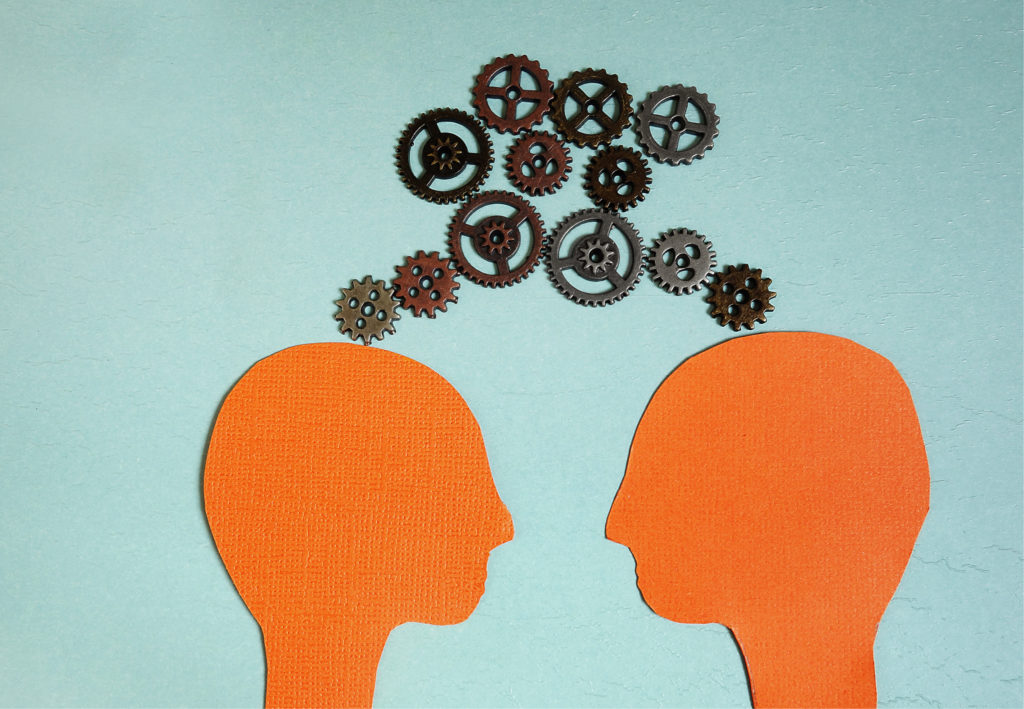Quick Hits
Daily brief research updates from the cognitive sciences

In case you didn’t know it brain synchronisation (or inter-brain synchronisation) is a thing. And a pretty cool thing. This happens when two, or more, people do similar things together and their brains sync up meaning that the firing patterns become very similar to each other.
This means that that feeling of being on the same wavelength is a feeling for the very good reason that you actually are on the same wavelength. I have written in more detail about this effect, which is important, because it also predicts many things. For example, when solving business types of tasks, brain synchronisation predicts how effectively a team will operate together. And also, how well they solve problems together. Similarly in audiences at concerts brain synchronisation predicts how well they enjoy it.
We could assume that this is related to how similar we are – with similar experiences and attitudes we are most likely to have brain synchronisation, but this piece of research shows that babies and adults playing together also show strong brain synchronisation.
Researchers at Princeton University set up the first experiment of this kind. It must be noted that measuring inter-brain synchrony is hard at the best of times due to its complexities i.e. measuring multiple brains and matching timing precisely. They managed by recruiting 42 children and using a technology called functional near-infrared spectroscopy (fNIRS) which measure blood flow similar to those pretty scans we often see.
However, 18 were too fidgety to give good readings and 3 flat out refused to wear the cap for measurement. That left 18 recordings.
Of interest is that in this study the same adult played with each child. Each child engaged in two scenarios: one playing with the adult, and another interacting with a parent while the other adult spoke to another person.
While the adult and child were playing brain synchronisation ramped up showing that similar processes were happening in their brains despite the large differences in age.
So, there you have it: parents when you play with your children you are getting on the same wavelength, and I am sure that is good for you.
For you business folk this is not just a random study, because inter-brain synchronisation is important for high performance in teams in business.
Here’s to syncing up!

Andy Habermacher
Andy is author of leading brains Review, Neuroleadership, and multiple other books. He has been intensively involved in writing and research into neuroleadership and is considered one of Europe’s leading experts. He is also a well-known public speaker speaking on the brain and human behaviour.
Andy is also a masters athlete (middle distance running) and competes regularly at international competitions (and holds a few national records in his age category).
Reference
Elise A. Piazza, Liat Hasenfratz, Uri Hasson, Casey Lew-Williams.
Infant and Adult Brains Are Coupled to the Dynamics of Natural Communication.
Psychological Science, 2019; 095679761987869
DOI: 10.1177/0956797619878698
More Quick Hits
Smartphones Improve Your Memory
Quick HitsDaily brief research updates from the cognitive sciencesany people believe that using smartphones and other electronic devices is ruining our memories and ability to think or simply use our brains. Research has shown a more nuanced...
How Meditation Helps Pain In Your Brain
Quick HitsDaily brief research updates from the cognitive sciences es, meditation can help with pain by changing your experience of it. I reported on that here. Another piece of research just published shows that how experienced meditators and...
When Stress Is Good For Brain Functioning
Quick HitsDaily brief research updates from the cognitive sciences tress gets a bad rap – understandably it is a negative experience and has been shown over long periods of time, and with high intensity, to cause multiple negative outcomes, from...
Put Your Smartphone Down and Let your Mind Wander – You’ll Be Happier
Quick HitsDaily brief research updates from the cognitive sciences here’s a lot been said about smartphone usage and how it can be used and abused. Most of this concern revolves around usage in children or teenagers, however, with some research...
The Amazing Impact Of Reaching Out To Your Old Friends
Quick HitsDaily brief research updates from the cognitive sciences few weeks ago a friend I hadn’t seen for about 10 years sent me a message and asked if I had time to meet up. I was elated. "Sure," I immediately messaged back, "when and where?!"...
Really? Belief In Conspiracies Not Increasing
Quick HitsDaily brief research updates from the cognitive sciences e may feel like we’re in an age of conspiracy theories, that social media is turbocharging the wild and wacky theories, and the so-called information bubbles are sending people down...






